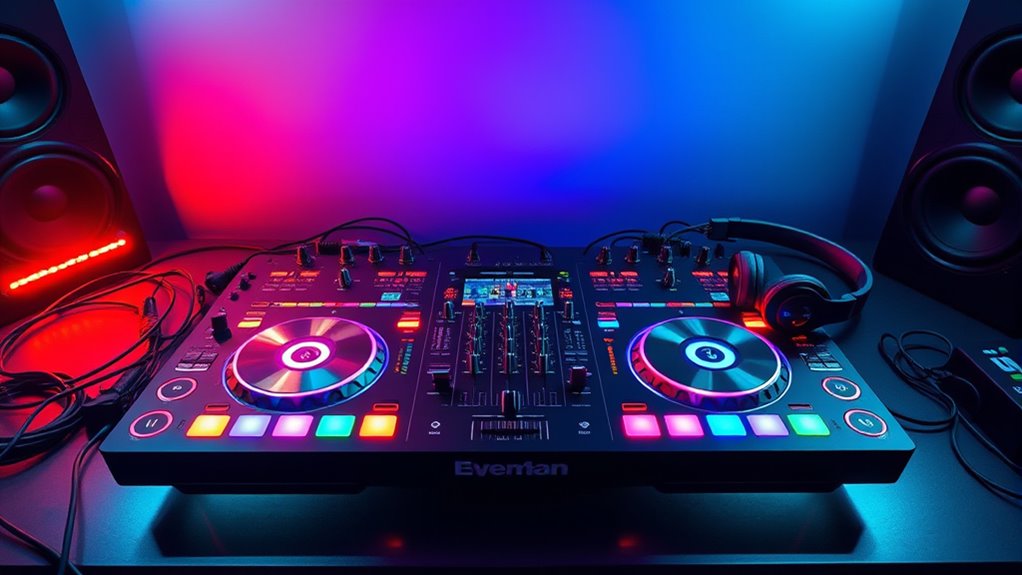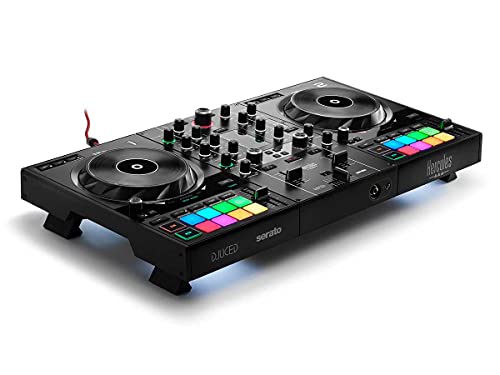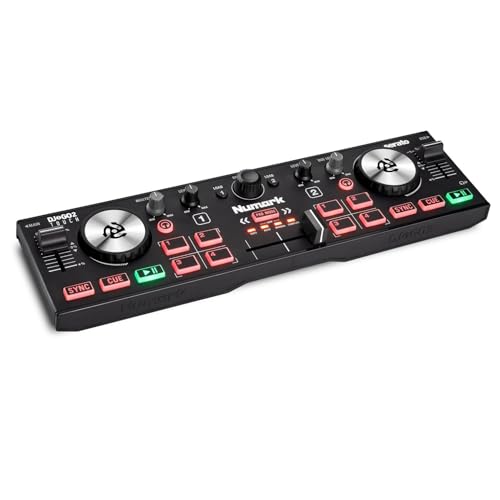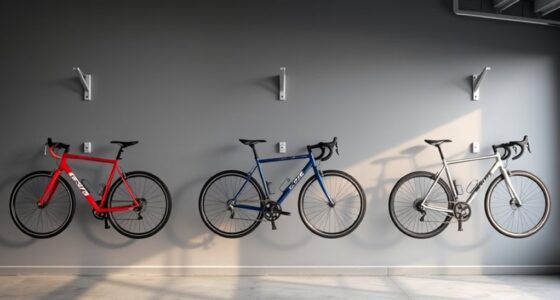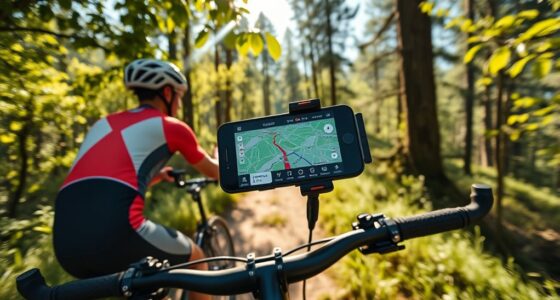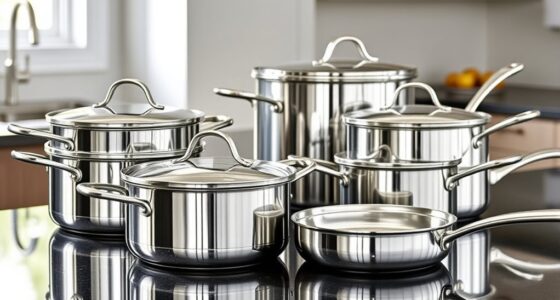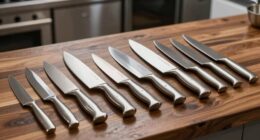If you’re looking for the 13 best DJ controller setups of 2025, I’ve got you covered. From compact controllers like the Numark DJ2GO2 Touch to advanced all-in-one systems like the Denon DJ SC LIVE 4, there’s something for every skill level and style. I’ll guide you through options supporting various software, connectivity needs, and features that boost your performance. Keep going, and you’ll discover how to pick the perfect setup for your gigs.
Key Takeaways
- Overview of top DJ controller types, including portable, all-in-one, vinyl-style, professional, and beginner kits for 2025.
- Key features to consider: software compatibility, connectivity options, size, performance controls, and future expandability.
- Insights into user experience enhancements like performance pads, visual feedback, and creative features for live shows.
- Guidance on choosing controllers based on budget, build quality, portability, and reliability for different DJing needs.
- Recommendations for the best setups combining hardware and software to optimize performance and ease of use in 2025.
Pioneer DJ DDJ-FLX4 2-deck Rekordbox and Serato DJ Controller – Graphite
If you’re just starting out or want a portable, easy-to-use DJ controller, the Pioneer DJ DDJ-FLX4 is an excellent choice. It’s a compact, lightweight 2-channel controller that works with both Rekordbox and Serato DJ, making it versatile for different setups. The layout is simple and professional, with smooth jog wheels and responsive pads that feel great under your fingers. It’s perfect for home, travel, or small gigs, offering solid build quality and excellent sound. Its user-friendly design means you can set it up quickly and start mixing right away, making it ideal for beginners and intermediate DJs alike.
Best For: beginners and intermediate DJs seeking a portable, user-friendly controller compatible with Rekordbox and Serato DJ for home, travel, or small gigs.
Pros:
- Compact, lightweight design for easy portability
- Simple, professional layout with responsive jog wheels and pads
- Supports both Rekordbox and Serato DJ software for versatile use
Cons:
- Lacks advanced features like balanced XLR outputs found in higher-end controllers
- Short USB-C cable may require additional accessories for flexible setup
- Limited connectivity options, which may restrict professional or streaming integrations
Denon DJ SC LIVE 4 Standalone DJ Controller
The Denon DJ SC LIVE 4 stands out as an ideal choice for mobile DJs and performers who want professional-grade capabilities without relying on a laptop. With its standalone Engine DJ OS, I can load tracks via SD card or USB and browse my library seamlessly on the 7-inch touchscreen. It supports high-quality stems, making my mixes more dynamic. I can access over 100 million tracks through streaming services like TIDAL and Apple Music, plus Bluetooth, Wi-Fi, and multiple media inputs for versatile connectivity. Built-in speakers deliver immersive sound, and advanced features like FX, autoloops, and synchronized lighting boost my performance quality.
Best For: mobile and performance DJs seeking a professional-grade, laptop-free setup with versatile connectivity and immersive sound.
Pros:
- Standalone operation with no need for a laptop, offering portability and ease of use
- Supports high-quality stems and streaming services for dynamic, versatile mixes
- Built-in speakers and advanced lighting effects enhance live performances and visual engagement
Cons:
- Requires a one-time software license for stems and advanced features, adding to initial cost
- Limited to Engine DJ OS; may have a learning curve for new users unfamiliar with the platform
- Physical controls and features may be less extensive than full-sized, laptop-based DJ setups
Denon DJ SC LIVE 4 WHITE DJ Controller
Designed for versatile performance, the Denon DJ SC LIVE 4 WHITE stands out as an all-in-one DJ controller perfect for mobile DJs, live streamers, and club performers. It features a 4-channel standalone setup with built-in speakers, a 7-inch HD touchscreen, and support for Wi-Fi streaming from services like TIDAL and SoundCloud. Its Engine DJ OS enables laptop-free operation, while onboard Stems allow live remixing of vocals, melodies, and drums. With compatibility for Serato DJ Pro and Virtual DJ, plus smart lighting control and multiple media inputs, it’s a powerful, portable system that simplifies setup and enhances live performances.
Best For: mobile DJs, live streamers, and club performers seeking an all-in-one, portable DJ system with built-in speakers and versatile connectivity.
Pros:
- All-in-one design with built-in speakers and touchscreen for easy setup and use
- Supports Wi-Fi streaming from popular services like TIDAL, SoundCloud, and Apple Music
- Compatible with Serato DJ Pro and Virtual DJ, offering flexible software options
Cons:
- Some users report touchscreen responsiveness issues requiring updates or resets
- Built-in speakers, while high-quality, may not meet studio-grade standards for critical listening
- Slightly heavier and larger compared to compact controllers, affecting portability for some users
Numark Mixtrack Platinum FX DJ Controller with Jog Wheel Displays
For DJs who want a versatile controller with advanced visual feedback, the Numark Mixtrack Platinum FX stands out thanks to its high-resolution color jog wheel displays. These 6-inch capacitive-touch jog wheels show BPM, platter position, beats remaining, pitch, and key, giving instant, real-time info. With four decks control and integrated Serato DJ Lite, it’s perfect for dynamic live sets. The controller also includes eight performance pads per deck for cues, loops, and samples, plus six effects with dual paddle triggers. Its seamless USB connection, built-in 24-bit audio interface, and extensive outputs ensure compatibility with various setups, making it a top choice for versatile, creative DJing.
Best For: DJs seeking a versatile, feature-rich controller with advanced visual feedback and seamless integration for dynamic live performances.
Pros:
- High-resolution color jog wheel displays providing real-time BPM, pitch, and platter info
- Supports control of 4 decks with extensive performance pads and effects for creative mixing
- Plug-and-play USB connectivity with built-in 24-bit audio interface ensures easy setup and high sound quality
Cons:
- May be complex for complete beginners due to its advanced features and controls
- Larger size might require more space for setup and transport
- Some users might find the extensive features overwhelming if only casual DJing is needed
Pioneer DJ DDJ-REV1 2-deck Serato DJ Controller
If you’re just starting out or want a reliable, user-friendly controller for casual gigs, the Pioneer DJ DDJ-REV1 is an excellent choice. Its battle-style layout mimics professional mixers and turntables, giving you an authentic DJ experience. The controller is compatible with Serato DJ Lite, making it easy to set up and use right away. Its compact design, weighing just over 5 pounds, is perfect for portable use at parties or practice. Users love its straightforward controls, scratch capabilities, and retro look. While some experience minor jog wheel issues, overall, it’s praised for reliability, value, and ease of learning, making it ideal for beginners and hobbyists alike.
Best For: beginners, hobbyists, and casual DJs seeking an easy-to-use, portable DJ controller with a battle-style layout for practice and small gigs.
Pros:
- User-friendly interface and plug-and-play compatibility with Serato DJ Lite
- Compact, lightweight design ideal for portability and on-the-go use
- Authentic battle-style layout with scratch capabilities for learning and performance
Cons:
- Small jog wheels may limit control precision compared to larger platters or professional gear
- Some users experience jog touch layer malfunctions after extended use
- Does not support running analog signals through the mixer, limiting certain mixing options
Roland DJ Controller with Serato DJ Pro Upgrade
The Roland DJ-202 stands out as an excellent choice for DJs seeking portability combined with professional features, especially after upgrading to Serato DJ Pro. Its compact design makes it easy to transport, while the large, low-latency platters are perfect for scratching. The built-in drum kits from iconic Roland TR series, combined with onboard sequencer and vocal FX, add creative options. The free upgrade to Serato DJ Pro release advanced mixing, effects, and full control, elevating its performance. Lightweight yet rugged, the DJ-202 offers a versatile, feature-rich platform ideal for both mobile gigs and studio practice at an accessible price point.
Best For: DJs seeking a portable, feature-rich controller with professional-grade performance and creative tools, suitable for both beginners and semi-professionals.
Pros:
- Compact, lightweight, and highly portable design with easy-to-carry handles.
- Built-in Roland drum kits and onboard sequencer for creative flexibility.
- Free upgrade to Serato DJ Pro unlocks advanced mixing features and effects.
Cons:
- Crossfader can feel cheap and clacky during scratching.
- Manual lacks detailed instructions, which may require additional troubleshooting.
- Some sliders and knobs may feel loose or less durable over time.
Hercules DJ Essentials Kit, All-in-One DJ Learning Set
Beginners seeking an all-in-one solution to kickstart their DJ journey will find the Hercules DJ Essentials Kit an ideal choice. This compact, plug-and-play set includes the DJControl Inpulse 300 MK2 controller, DJMonitor 42 speakers, and HDP DJ60 headphones, making it perfect for learning and practicing at home. It’s compatible with Hercules DJUCED and Serato DJ Lite, offering free tutorials and a music library. The controller’s responsive jog wheels, smooth faders, and built-in light guides help beginners master beatmatching and basic mixing. While software stability can be a minor concern, overall, this kit provides a user-friendly, affordable way to develop DJ skills confidently.
Best For: beginners and aspiring DJs seeking an all-in-one, easy-to-use, and affordable setup for learning fundamental DJ skills at home.
Pros:
- User-friendly, plug-and-play design ideal for beginners with no prior experience
- Includes essential gear—controller, speakers, and headphones—in a compact, portable package
- Compatible with free software tutorials and music libraries to facilitate learning and skill development
Cons:
- Occasional software stability issues like hanging or minor bugs
- Limited BPM range and slight hardware-software control misalignments may require adjustments
- Plastic build of some components might affect long-term durability
Hercules DJ Control Inpulse T7 DJ Controller
For DJs who want a vinyl-like experience without the need for expensive turntables, the Hercules DJ Control Inpulse T7 stands out as an excellent choice. It features two motorized platters designed to mimic real vinyl, complete with a replica record, felt slipmat, and platter removal for an authentic feel. The 3.9-inch tempo faders match the resolution of traditional turntables, making beatmatching intuitive. Lightweight at just 11 pounds, it’s portable with retractable feet and side handles. Compatible with Serato and Djuced, and equipped with a sturdy USB cable, this controller is perfect for both beginners and experienced DJs seeking vinyl-style control.
Best For: DJs seeking an authentic vinyl-like experience with a portable and budget-friendly controller suitable for both beginners and professionals.
Pros:
- Realistic motorized platters and removable vinyl for authentic turntable feel
- Compatible with Serato and Djuced for versatile software use
- Lightweight design with portability features like retractable feet and side handles
Cons:
- May lack advanced features found in high-end DJ controllers
- Limited to two channels, which might restrict complex mixing
- Requires familiarity with DJ software for optimal use
Hercules DJControl Inpulse 200 MK2 DJ Controller with Software
If you’re starting out in DJing and want an affordable, user-friendly controller, the Hercules DJControl Inpulse 200 MK2 is an excellent choice. It comes with built-in tutorials, including a Beatmatch Guide with light cues that help you learn essential skills like tempo matching and beat alignment. The device supports popular software like Serato DJ Lite and DJUCED, which are compatible with Serato DJ Pro, offering flexible workflows. Plus, it integrates streaming services such as Beatport, SoundCloud GO+, and TIDAL, making it easy to access a vast library of tracks. Overall, it’s a solid, beginner-friendly setup that encourages creativity and learning.
Best For: beginners and aspiring DJs looking for an affordable, easy-to-use controller with educational features and streaming capabilities.
Pros:
- Built-in tutorials and Beatmatch Guide to facilitate learning.
- Compatible with popular DJ software like Serato DJ Lite, DJUCED, and streaming services.
- Creative features like STEMS for unlimited mixing options.
Cons:
- May have limited advanced features for professional use.
- Software compatibility might require updates or additional setup.
- Built-in guides might not replace the experience of hands-on practice with more advanced equipment.
Hercules DJControl Inpulse 500 DJ Controller
The Hercules DJControl Inpulse 500 stands out as an excellent choice for aspiring DJs who want a versatile, feature-rich controller without breaking the bank. Its sturdy metal top plate, full-size jog wheels, and an intuitive layout make it suitable for both beginners and experienced DJs. With 16 RGB pads, a hardware mixer, and integrated filters, it supports smooth progression and precise cueing. Compatible with Serato DJ Lite (upgradeable to Pro) and DJUCED, it offers flexible software options and helpful learning tools. Its durable build, ergonomic design, and extensive port selection make it a reliable, value-packed device perfect for home practice, small gigs, or as a backup setup.
Best For: aspiring DJs and beginners seeking a durable, feature-rich controller for home practice, small gigs, or as a reliable backup setup.
Pros:
- Solid build quality with a metal top plate and ergonomic design for durability and comfort
- Versatile software compatibility with Serato DJ Lite/Pro and DJUCED, plus helpful learning tools
- Intuitive layout with responsive jog wheels, RGB pads, and extensive port options for flexible setups
Cons:
- Limited to 2 decks, which may restrict more advanced mixing or club performances
- Some users report bugs with DJUCED software, potentially affecting stability
- Not a standalone mixer; relies on connected software for full functionality
Numark DJ2GO2 Touch Compact DJ Controller with 2 Decks
Ideal for mobile DJs, beginners, and those who need a reliable secondary setup, the Numark DJ2GO2 Touch Compact DJ Controller with 2 Decks delivers portability without sacrificing essential features. It’s lightweight at just 14.9 ounces and easily fits on any DJ table or laptop stand. The device offers responsive touch-capacitive jog wheels, pitch faders, and a crossfader, making it great for beat matching and basic mixing. With built-in audio interface, headphone and main outputs, and Serato DJ Lite preloaded, it’s perfect for practicing, rehearsals, or small gigs. While it lacks EQ controls, its compact design and straightforward controls make it an excellent budget-friendly option for entry-level DJs.
Best For: mobile DJs, beginners, and performers seeking a portable, easy-to-use secondary DJ setup.
Pros:
- Compact and lightweight design for portability and easy transport
- Responsive touch-capacitive jog wheels and straightforward controls for basic mixing and scratching
- Preloaded with Serato DJ Lite, supporting seamless software integration and track browsing
Cons:
- Lacks EQ controls, limiting advanced sound shaping options
- Jog wheels may have sensitivity issues causing glitches for some users
- Limited features compared to larger, more advanced DJ controllers
Numark Mixtrack Pro FX DJ Controller with Effects and Audio Interface
For beginner and intermediate DJs seeking an affordable yet feature-rich controller, the Numark Mixtrack Pro FX stands out with its integrated effects paddles and high-quality audio interface. It offers a 2-deck setup with large, capacitive-touch jog wheels that feel natural and responsive. The 16 backlit performance pads per deck provide quick access to hot cues, loops, and samples, while the dedicated FX paddles give hands-on control over effects like Echo, Reverb, and Phaser. With plug-and-play USB connectivity, a 24-bit audio interface, and compatibility with Serato DJ Lite, it’s perfect for practicing, gigs, or streaming. It’s a versatile, durable choice for DJs ready to expand their skills.
Best For: beginner and intermediate DJs looking for an affordable, feature-rich controller with integrated effects and high-quality audio.
Pros:
- Intuitive layout with large, responsive 6-inch jog wheels for natural feel
- Versatile performance pads and dedicated FX paddles for creative control
- Seamless plug-and-play USB connectivity compatible with Serato DJ Lite and streaming services
Cons:
- Some users experience unresponsive jog wheels or connectivity issues
- Limited output options, primarily RCA, which may not suit all setups
- Performance may be demanding on mid-range laptops, affecting smooth operation
Hercules DJControl Mix Ultra Mobile DJ Controller for Smartphones
If you’re a mobile DJ or casual music enthusiast seeking a compact and versatile controller, the Hercules DJControl Mix Ultra stands out with its wireless design and built-in rechargeable battery. Its lightweight build makes it easy to carry, and it comes with a cover and smartphone stand for added convenience. Compatible with both iOS and Android devices, it supports streaming services, giving you vast music options. The standout feature is the Neural Mix, which offers professional-grade mixing capabilities at no extra cost. Perfect for on-the-go setups, this controller combines portability with powerful features, making it an excellent choice for mobile DJs and casual users alike.
Best For: mobile DJs and casual music enthusiasts seeking a portable, wireless DJ controller with advanced mixing features.
Pros:
- Wireless design with built-in rechargeable battery for ultimate portability
- Includes cover and smartphone stand for convenience and protection
- Supports streaming services and features Neural Mix for professional-grade mixing
Cons:
- May have limited physical controls compared to larger DJ setups
- Compatibility depends on smartphone OS and app support
- Battery life might require frequent charging during extended use
Factors to Consider When Choosing DJ Controller Setups
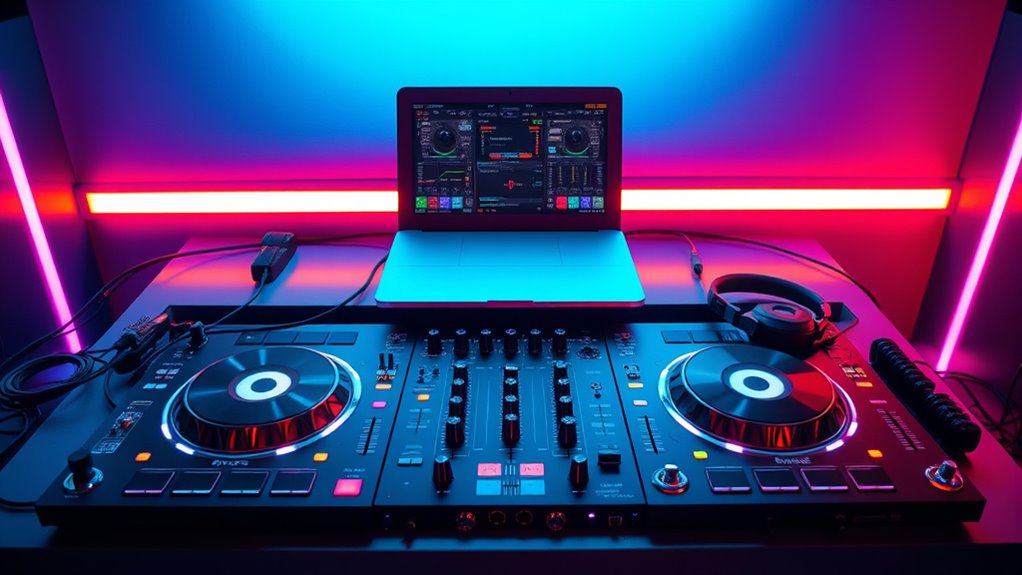
When choosing a DJ controller setup, I consider factors like software compatibility, portability, and the number of channels I need. I also look at built-in features that enhance my performance and keep my budget in check. These points help me pick a setup that fits both my style and needs perfectly.
Software Compatibility Needs
Choosing a DJ controller without considering software compatibility can lead to frustrating limitations and workflow disruptions. Make certain the controller works seamlessly with your preferred DJ software, such as Serato DJ, Rekordbox, Virtual DJ, or DJUCED, to guarantee full functionality. Check if the controller supports software upgrades or license keys, especially if you want access to advanced features like effects, remixing, or multi-deck control. Also, verify whether the compatibility is native or requires extra setup, like MIDI mapping or firmware updates. If you stream music, consider whether the controller supports streaming services integrated into the software. Ultimately, confirm that the hardware matches your computer’s operating system—Windows, macOS, or Linux—to prevent connectivity issues and optimize performance.
Portability and Size
Portability and size are essential factors to contemplate when selecting a DJ controller setup, especially for mobile DJs or those with limited space. Smaller controllers under 15 inches are easier to transport, fitting comfortably into bags or cases. Lightweight models, often weighing less than 10 pounds, reduce physical strain during setup and takedown. Compact designs with fewer decks and controls are perfect for tight venues or limited storage areas, making setup quick and hassle-free. Many portable controllers feature built-in batteries or USB power, eliminating the need for external power sources and enhancing mobility. The size and weight directly influence how easily you can move, set up, and adapt to different performance environments. Choosing a smaller, lighter controller can notably streamline your DJ workflow on the go.
Number of Channels
The number of channels on a DJ controller directly impacts how many audio sources you can mix at once, shaping both your setup and performance style. A 2-channel controller is perfect for simple mixing and portability, making it ideal for beginners or small gigs. If you want more flexibility, especially for complex mixes or multiple inputs, a 4-channel controller provides additional control and options. Controllers with more channels often include dedicated EQ, effects, and cue controls per channel, which helps create layered, dynamic mixes. For live performances involving external hardware or multiple sources, 4 or more channels are recommended to handle various inputs effortlessly. Ultimately, your choice should match your skill level, intended use, and setup complexity, ensuring you have enough control without unnecessary features.
Built-in Features
When evaluating DJ controllers, built-in features can substantially enhance your performance and simplify your setup. Features like performance pads, effects, and filters give you creative control without needing extra gear, making your workflow more efficient. Many controllers include integrated sound interfaces, so you can connect directly to speakers and headphones, reducing clutter and setup time. Onboard displays or jog wheel indicators provide real-time feedback on track tempo, position, and effects, helping you stay synchronized. Built-in lighting and visual cues assist in aligning your performance with lighting cues, creating a more engaging show. Advanced models often feature dedicated mic inputs, loop controls, and FX paddles, expanding your versatility right from the controller. These features make your setup more intuitive and performance-ready.
Budget Constraints
Choosing the right DJ controller setup starts with understanding your budget, as it directly influences the features and quality you can access. I recommend setting a clear overall budget first and then selecting a controller that offers the best value within that range. Keep in mind, additional costs like cables, speakers, and software can add up quickly, so factor those into your total expenses. Entry-level controllers typically cost under $500, perfect for beginners, while professional setups can exceed $1,000. Balance your budget with your skill level—beginners should prioritize affordability and simplicity, while more advanced DJs might justify higher costs for extra features. Also, consider ongoing expenses, such as software subscriptions or upgrades, which can impact your long-term budget.
Connectivity Options
Selecting the right DJ controller involves more than just features and budget; connectivity options play a key role in guaranteeing your setup works smoothly. I look for controllers with USB ports because they connect easily to my laptop and provide power and data transfer. Some controllers have multiple USB inputs, giving me flexibility during live sets. I also consider audio outputs like RCA, 1/4 inch, XLR, or 3.5mm jacks to connect to speakers and monitors seamlessly. Wireless options like Bluetooth or Wi-Fi are handy for streaming music or controlling software remotely, boosting portability. External media compatibility, such as SD cards or USB drives, lets me load music without a computer. Overall, versatile connectivity options ensure my setup is reliable, flexible, and ready for any gig.
Performance and Responsiveness
Performance and responsiveness are essential factors because they directly impact how smoothly I can mix and perform. A responsive controller with low latency, ideally below 4 milliseconds, allows me to cue, beatmatch, and scratch in real time without lag. High-quality jog wheels and faders give tactile feedback and precision, making transitions seamless. Touch-sensitive pads and smooth controls enable me to trigger samples, loops, and effects effortlessly. Compatibility with my DJ software and hardware setup guarantees I experience minimal delays, especially with plug-and-play options. Additionally, keeping firmware updated is indispensable, as it can improve responsiveness and fix latency issues. Overall, a controller that reacts instantly helps me maintain the flow and energy during my sets, making performance more natural and engaging.
Future Expansion Potential
As I look ahead to building a versatile DJ setup, considering future expansion potential becomes a key part of my decision-making. I want a controller with a flexible software ecosystem that supports upgrades and additional hardware modules, so I can add new features over time. Multiple media inputs and outputs are essential for seamless integration with external devices, expanding my setup as needed. I also prioritize models that support firmware updates and software enhancements, ensuring compatibility with future technology. MIDI mapping capabilities are vital for customizing controls and incorporating new effects or instruments as my skills grow. Lastly, I consider the potential to link multiple controllers or set up multi-unit configurations, allowing me to perform more complex live sets and adapt to evolving performance needs.
Frequently Asked Questions
How Do Different Controller Compatibility Options Affect Setup Flexibility?
Controller compatibility options really influence my setup flexibility because they determine which hardware and software I can combine seamlessly. When controllers support multiple platforms or have versatile connectivity options, I can easily customize my rig for different gigs or styles. This adaptability means I’m not limited by a single brand or setup, giving me freedom to upgrade, experiment, and optimize my gear without hassle or compatibility issues.
What Are the Best Features for Beginner Versus Professional Use?
For beginners, basic features like intuitive interfaces, clear layouts, and simple controls make learning easier and enjoyable. Pros, on the other hand, crave advanced features like customizable controls, high-resolution jog wheels, and seamless software integration for superior sound and style. I’ve found that beginner-friendly setups foster confidence, while professional gear pushes creativity. Whether you’re starting out or stepping up, choosing features that fit your skill level makes all the difference.
How Does Portability Impact Performance and Connectivity?
Portability really boosts my performance by allowing me to take my setup anywhere, making spontaneous gigs easier. It also impacts connectivity since smaller controllers often have limited ports, so I need to be strategic about what devices I connect. I find that a balance between portability and robust connectivity helps me perform confidently without sacrificing quality, especially when I’m on the move or working in different venues.
Which Controllers Offer the Most Customizable Effects and Sound Options?
Controllers like Pioneer’s DDJ-1000 and Roland’s DJ-808 deliver dazzling, diverse, and customizable effects and sound options. I love how these decks let me tweak tunes with tailored filters, reverb, and echo, creating a enthralling, unique sound every time. Their intuitive interfaces make it easy to experiment and elevate my sets. If you crave creative control, these controllers are my top picks for pushing performance boundaries and producing pristine, personalized soundscapes.
How Do Software Updates Influence Long-Term Controller Usability?
Software updates are vital for maintaining my controller’s usability over time. They fix bugs, add new features, and improve compatibility with evolving music software. Without updates, my controller could become outdated or less functional, limiting my creative options. I always keep my software current to guarantee smooth performance, access to new effects, and ongoing support. This way, I can confidently rely on my gear as I grow and evolve as a DJ.
Conclusion
After exploring these top setups, I believe the right DJ controller isn’t just about features but how it aligns with your style. It’s like the theory that a tool becomes an extension of the artist—when you find the perfect match, your creativity flows effortlessly. So, trust your instincts, consider your needs, and remember, the best setup is the one that makes you feel most connected and inspired behind the decks.
